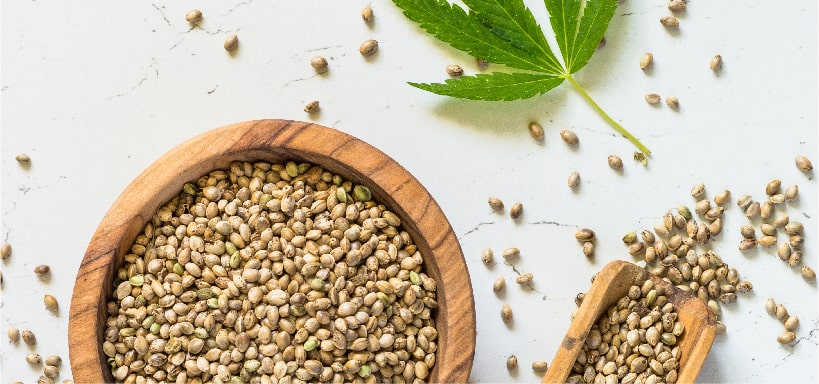
For a long time, hemp seeds were ignored for their nutritional benefits because of hemp’s botanical relationship to medicinal varieties of cannabis. People are often confused about hemp seed nutrition and whether or not the seeds contain cannabinoids, like CBD.
The truth is that hemp seeds don’t cause any psychotropic reactions and instead may provide significant health benefits because of the fatty acids and essential amino acids present in the seeds.
Hemp is a variety of the cannabis plant that actually has a long history of use in the U.S. Unfortunately, since the 1950s it’s been lumped into the same category as “marijuana” (or cannabis) because it contains a small amount of naturally occurring tetrahydrocannabinoids (THC), and its use has been marginalized to a great extent.
But when eating hemp seeds or consuming hemp seed oil, the cannabinoids aren’t present. Cannabinoids like CBD and THC are found in the leaves and flowers of the plant but not in the seeds.
Instead, this superfood is consumed for its omega-3 and omega-6 fatty acids and its antioxidant effects.
So if you’re looking to improve digestion, balance hormones and improve metabolism, then hemp seeds may just be the superfood you’re looking for.
What Are Hemp Seeds? | Health Benefits | Nutrition Facts | How to Use | Drug Interactions
What Are Hemp Seeds?
Hemp seeds, or hemp hearts, are the seeds of the hemp plant, or Cannabis sativa. They are technically nuts but are referred to as seeds or hearts.
Each part of the hemp plant offers different compounds and the seeds are no different. There’s plenty of confusion about the many parts of hemp and their uses, especially as the market continues to grow.
There are hemp seeds, hempseed oil, hemp extracts, CBD oils and more.
Hemp is actually one of the most widely utilized and diverse industrial crops in the world. It’s used for industrial purposes because of its durable natural fibers and for its nutritional content.
Hemp seed oil, or hemp oil, is made by pressing hemp seeds. Unlike CBD oil, which is used to treat pain and issues, hemp seeds are commercially manufactured products that don’t contain cannabinoids.
Hemp hearts are an excellent source of nutrients, especially unsaturated fatty acids and essential amino acids. Research shows that the benefits of hemp seeds include their ability to alleviate constipation, support cardiovascular health, improve dermatological issues and ameliorate gastrointestinal diseases.
Health Benefits
1. Rich in GLA
Gamma-linolenic acid (GLA) is a necessary building block for some prostaglandins — hormone-like chemicals in the body that help smooth muscles, control inflammation and body temperature, and are vital to other body functions.
Research published in the European Journal of Pharmacology indicates that GLA-supplemented diets attenuate inflammatory responses.
GLA and GLA-rich foods like hemp seeds have also been observed to help people with:
- ADHD
- Breast pain
- Diabetes and diabetic neuropathy
- Heart disease
- High blood pressure
- Multiple sclerosis
- Obesity
- Premenstrual syndrome
- Rheumatoid arthritis
- Skin allergies
2. May Alleviate Arthritis and Joint Pain
Research has shown that hemp hearts and hemp seed oil can be helpful in relieving rheumatoid arthritis symptoms.
A study published in the Journal of Ethnopharmacology took a look at hemp seed oil’s effects on arthritis. What researchers found was hemp seed oil treatment lowered the survival rate of MH7A rheumatoid arthritis fibroblast-like synovial cells, and at certain doses it even promoted cell death.
They concluded that hemp seed oil has anti-arthritic effects, which can help patients suffering from its symptoms.
3. May Aid Weight Loss
Consuming seeds from the hemp plant works as a natural appetite suppressant and can help you feel full longer and reduce sugar cravings.
Adding these seeds, and other high-fiber foods, to meals or smoothies may help curb excess hunger. This is partly due to the fiber content, which promotes satiety and in turn aids weight loss.
According to a systematic review published in the Journal of the American College of Nutrition, fiber intake is associated with a lower body weight. This can likely be due to satiety and energy intake after eating a meal high in fiber.
4. Improves Digestive Health
High in insoluble and soluble fiber, hemp seeds provide more than enough bulk to keep your gastrointestinal system regular. Additionally, this healthy mixture of roughage feeds the probiotics in your gut and helps secure a robust immune system.
One of the benefits of high-fiber foods is their ability to help relieve constipation.
READ RELATED: The Most Common Reasons Why Your Fingers or Hands Are Peeling
A study published in the American Journal of Gastroenterology and conducted at Hong Kong Baptist University’s School of Chinese Medicine comprised two parts: a placebo-controlled clinical study and dose determination study. Subjects were studied in a two-week run-in, eight-week treatment and eight-week follow-up plan who had excessive syndrome of constipation and were given hemp seed pills.
The researchers found that a dose of 7.5 grams was more effective and therapeutic than doses of 2.5 or five grams, and that the hemp seed pill treatment was effective for relieving functional constipation.
5. Boosts Hair, Skin and Nail Health
Hemp seed benefits for skin and hair go a long way in improving dry, red, flaking skin.
Mostly used in high-end cosmetic products, hemp oil is oftentimes included in lip balms, lotions and soaps. The oil in hemp seeds penetrates the inner layers of the skin and promotes healthy cell growth — the recipe for smooth, soft skin.
In fact, researchers studying the effects of oil extracted from hemp hearts on atopic dermatitis, or eczema, a skin condition that causes inflammation and dry skin, found that patients’ symptoms improved with the use of the oil.
Since the oil is also good for skin disorders, such as psoriasis and eczema, it’s also a good idea to add the plant’s seeds to your diet to maximize these benefits. You can also make a homemade skin cream combining hemp seed oil, shea butter and essential oils like lavender.
6. Reduces Inflammation
Because of its perfect fatty acid profile of omega-3 fats and GLA, hemp seed helps to naturally reduce inflammation levels and strengthen the immune system.
Research published in ACS Omega indicates that hempseed has immunomodulating, antioxidant and anti-aging effects.
7. Heart Health
Some of the key ingredients in building a healthy heart include fiber, plant-based protein, healthy fats and eating less sugar. Hemp seeds help in doing all of these things.
Research in animals and humans strongly suggests that hemp seeds can improve cardiovascular health and high blood pressure.
Adding one to two tablespoons of hemp seeds to a morning smoothie may help to naturally lower blood pressure, reduce LDL cholesterol, raise HDL cholesterol and improve triglycerides.
Nutrition Facts
Researchers agree that hemp hearts provides an excellent source of nutrition. Here are some key facts about the incredible health benefits this superfood offers:
- Excellent 3:1 balance of omega-3 and omega-6 fatty acids, which promote cardiovascular health.
- High in GLA, an essential omega-6 fatty acid that’s been proven to naturally balance hormones.
- “Perfect protein” not only containing all 20 amino acids, but also each of the nine essential amino acids that our bodies cannot produce.
According to the USDA, 28 grams (about 2 tablespoons) of hemp seeds contains about:
- 161 calories
- 3.3 grams carbohydrates
- 9.2 grams protein
- 12.3 grams fat
- 2 grams fiber
- 2.8 milligrams manganese (140 percent DV)
- 15.4 milligrams vitamin E (77 percent DV)
- 300 milligrams magnesium (75 percent DV)
- 405 milligrams phosphorus (41 percent DV)
- 5 milligrams zinc (34 percent DV)
- 3.9 milligrams iron (22 percent DV)
- 0.1 milligram copper (7 percent DV)
Hemp Seeds vs. Chia Seeds
Chia seeds pack much of the same nutritional punch as hemp seeds. However, hemp seeds have a more well-rounded nutrition profile.
That said, chia seeds have a bit more fiber than hemp seeds, with five grams of fiber per tablespoon.
Both types of seeds can be added to smoothies, oatmeal, yogurt, baked goods and other recipes.
How to Use
These days, you can find hemp seeds in most grocery stores and health food stores. They have a mild nutty taste.
Hemp seeds are used to make several products, including the following:
- Hemp nut butter: The seeds are also ground and made into hemp nut butter, which you can consume like you would peanut or almond butter.
- Hemp milk: Much like almond milk, you can use hemp milk as a dairy-free alternative. Hemp milk is a tasty and nutrient-rich addition to any smoothie recipe.
- Hempseed oil: Hempseed oil is on the grocery store shelves, too. It’s best to use hempseed oil as a finishing oil rather than as a cooking oil. Drizzle it on salads and pastas or other dishes. You can also use hempseed oil topically to moisturize your skin, reduce signs of aging and boost hair health.
- Hemp protein powder: This is an excellent plant-based, vegan protein powder that supplies omega-3s, essential amino acids, magnesium and iron.
Hemp seeds are sensitive to heat and light. It’s also best to store them in a cool, dry place or in the fridge.
There are quite a few ways to use the seeds and the butter, milk and oil that’s made from them. Here are some ideas:
- Add hemp seeds to smoothies or grind them up and sprinkle them on your yogurt, cereal or other meals.
- Make this Tropical Acai Bowl Recipe that’s made with mango and hemp hearts.
- Try recipes that incorporate hemp hearts, like this Pecan Coconut Balls.
- Combine hemp protein powder with your favorite milk (like almond or coconut milk) to make a plant-based protein shake for before or after workouts.
Drug Interactions
There really aren’t any hemp seed side effects. Hemp hearts are high in nutrition and aren’t known to cause any drug interactions with common medications.
However, if you take anticoagulants, you may want to be more cautious about consuming hemp seeds because they inhibit blood platelets and may cause a bleeding risk.
If you have concerns about possible interactions with any medications, check with your healthcare provider.
Final Thoughts
- Hemp seeds, or hemp hearts, have an excellent nutrition profile and are a healthy addition to most diets.
- Although hemp seeds come from the Cannabis sativa plant species, they do not contain cannabinoids like CBD and THC.
- The benefits of hemp seeds include improving symptoms of arthritis and joint pain, improving heart and digestive health, promoting hair, skin and nail health, and boosting the immune system.
- It’s easy to incorporate hemp hearts into your diet. They can be added to any smoothie or breakfast bowl.
- You’ll also find nut butter, hemp milk and protein powder made from the seeds.
- These seeds are not known to cause interactions with any common medications, but they may cause a risk if consumed by someone who is taking an anticoagulant medication. Check with your doctor if you are concerned about any possible drug interactions or hemp seed side effects.
Source:






